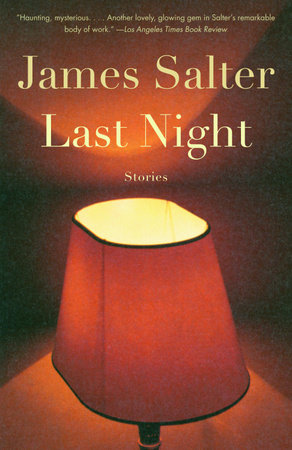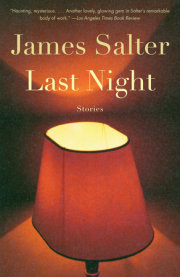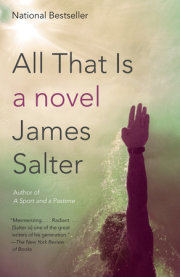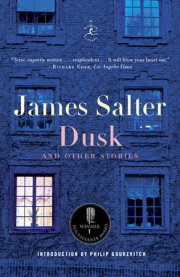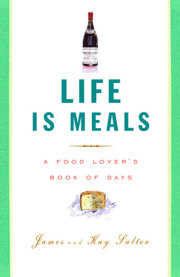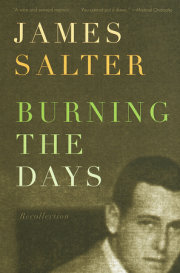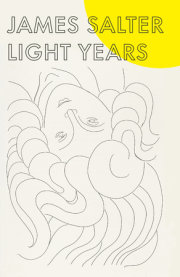Comet
Philip married Adele on a day in June. It was cloudy and the wind was blowing. Later the sun came out. It had been a while since Adele had married and she wore white: white pumps with low heels, a long white skirt that clung to her hips, a filmy blouse with a white bra underneath, and around her neck a string of freshwater pearls. They were married in her house, the one she’d gotten in the divorce. All her friends were there. She believed strongly in friendship. The room was crowded.
— I, Adele, she said in a clear voice, give myself to you, Phil, completely as your wife . . . Behind her as best man, somewhat oblivious, her young son was standing, and pinned to her panties as something borrowed was a small silver disc, actually a St. Christopher’s medal her father had worn in the war; she had several times rolled down the waistband of her skirt to show it to people. Near the door, under the impression that she was part of a garden tour, was an old woman who held a little dog by the handle of a cane hooked through his collar.
At the reception Adele smiled with happiness, drank too much, laughed, and scratched her bare arms with long showgirl nails. Her new husband admired her. He could have licked her palms like a calf does salt. She was still young enough to be good-looking, the final blaze of it, though she was too old for children, at least if she had anything to say about it. Summer was coming. Out of the afternoon haze she would appear, in her black bathing suit, limbs all tan, the brilliant sun behind her. She was the strong figure walking up the smooth sand from the sea, her legs, her wet swimmer’s hair, the grace of her, all careless and unhurried.
They settled into life together, hers mostly. It was her furniture and her books, though they were largely unread. She liked to tell stories about DeLereo, her first husband—Frank, his name was—the heir to a garbage-hauling empire. She called him Delerium, but the stories were not unaffectionate. Loyalty—it came from her childhood as well as the years of marriage, eight exhausting years, as she said—was her code. The terms of marriage had been simple, she admitted. Her job was to be dressed, have dinner ready, and be fucked once a day. One time in Florida with another couple they chartered a boat to go bonefishing off Bimini.
— We’ll have a good dinner, DeLereo had said happily, get on board and turn in. When we get up we’ll have passed the Gulf Stream.
It began that way but ended differently. The sea was very rough. They never did cross the Gulf Stream—the captain was from Long Island and got lost. DeLereo paid him fifty dollars to turn over the wheel and go below.
— Do you know anything about boats? the captain asked.
— More than you do, DeLereo told him.
He was under an ultimatum from Adele, who was lying, deathly pale, in their cabin. — Get us into port somewhere or get ready to sleep by yourself, she’d said.
Philip Ardet heard the story and many others often. He was mannerly and elegant, his head held back a bit as he talked, as though you were a menu. He and Adele had met on the golf course when she was learning to play. It was a wet day and the course was nearly empty. Adele and a friend were teeing off when a balding figure carrying a cloth bag with a few clubs in it asked if he could join them. Adele hit a passable drive. Her friend bounced his across the road and teed up another, which he topped. Phil, rather shyly, took out an old three wood and hit one two hundred yards straight down the fairway.
That was his persona, capable and calm. He’d gone to Princeton and been in the navy. He looked like someone who’d been in the navy, Adele said—his legs were strong. The first time she went out with him, he remarked it was a funny thing, some people liked him, some didn’t.
— The ones that do, I tend to lose interest in.
She wasn’t sure just what that meant but she liked his appearance, which was a bit worn, especially around the eyes. It made her feel he was a real man, though perhaps not the man he had been. Also he was smart, as she explained it, more or less the way professors were.
To be liked by her was worthwhile but to be liked by him seemed somehow of even greater value. There was something about him that discounted the world. He appeared in a way to care nothing for himself, to be above that.
He didn’t make much money, as it turned out. He wrote for a business weekly. She earned nearly that much selling houses. She had begun to put on a little weight. This was a few years after they were married. She was still beautiful—her face was—but she had adopted a more comfortable outline. She would get into bed with a drink, the way she had done when she was twenty-five. Phil, a sport jacket over his pajamas, sat reading. Sometimes he walked that way on their lawn in the morning. She sipped her drink and watched him.
— You know something?
— What?
— I’ve had good sex since I was fifteen, she said.
He looked up.
— I didn’t start quite that young, he confessed.
— Maybe you should have.
— Good advice. Little late though.
— Do you remember when we first got started?
— I remember.
— We could hardly stop, she said. You remember?
— It averages out.
— Oh, great, she said.
After he’d gone to sleep she watched a movie. The stars grew old, too, and had problems with love. It was different, though—they had already reaped huge rewards. She watched, thinking. She thought of what she had been, what she had had. She could have been a star.
What did Phil know—He was sleeping.
Autumn came. One evening they were at the Morrisseys’—Morrissey was a tall lawyer, the executor of many estates and trustee of others. Reading wills had been his true education, a look into the human heart, he said.
At the dinner table was a man from Chicago who’d made a fortune in computers, a nitwit it developed, who during the meal gave a toast,
— To the end of privacy and the life of dignity, he said.
He was with a dampened woman who had recently found out that her husband had been having an affair with a black woman in Cleveland, an affair that had somehow been going on for seven years. There may even have been a child.
— You can see why coming here is like a breath of fresh air for me, she said.
The women were sympathetic. They knew what she had to do—she had to rethink completely the past seven years.
— That’s right, her companion agreed.
— What is there to be rethought? Phil wanted to know.
He was answered with impatience. The deception, they said, the deception—she had been deceived all that time. Adele meanwhile was pouring more wine for herself. Her napkin covered the place where she had already spilled a glass of it.
— But that time was spent in happiness, wasn’t it? Phil asked guilelessly. That’s been lived. It can’t be changed. It can’t be just turned into unhappiness.
— That woman stole my husband. She stole everything he had vowed.
— Forgive me, Phil said softly. That happens every day.
There was an outcry as if from a chorus, heads thrust forward like the hissing, sacred geese. Only Adele sat silent.
— Every day, he repeated, his voice drowned out, the voice of reason or at least of fact.
— I’d never steal anyone’s man, Adele said then. Never. Her face had a tone of weariness when she drank, a weariness that knew the answer to everything. And I’d never break a vow.
— I don’t think you would, Phil said.
— I’d never fall for a twenty-year-old, either.
She was talking about the tutor, the girl who had come that time, youth burning through her clothes.
— No, you wouldn’t.
— He left his wife, Adele told them.
There was silence.
Phil’s bit of smile had gone but his face was still pleasant.
— I didn’t leave my wife, he said quietly. She threw me out.
— He left his wife and children, Adele said.
— I didn’t leave them. Anyway it was over between us. It had been for more than a year. He said it evenly, almost as if it had happened to someone else. It was my son’s tutor, he explained. I fell in love with her.
— And you began something with her? Morrissey suggested.
— Oh, yes.
There is love when you lose the power to speak, when you cannot even breathe.
— Within two or three days, he confessed.
— There in the house?
Phil shook his head. He had a strange, helpless feeling. He was abandoning himself.
— I didn’t do anything in the house.
— He left his wife and children, Adele repeated.
Copyright © 2005 by James Salter. All rights reserved. No part of this excerpt may be reproduced or reprinted without permission in writing from the publisher.

